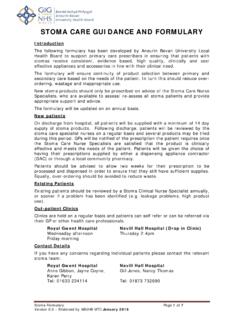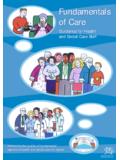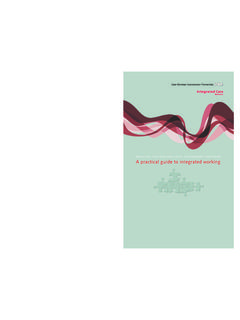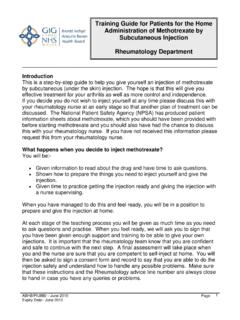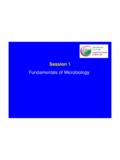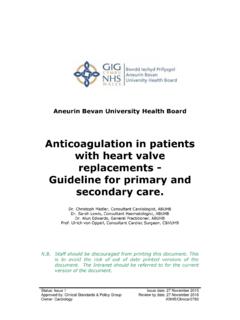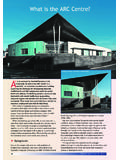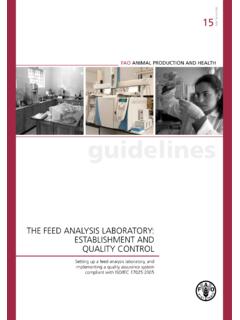Transcription of an RCN guide to the advanced nurse practitioner role ...
1 advanced nurse practitioners an RCN guide to the advanced nursepractitioner role, competences andprogramme accreditationRCN Com p e te nc e sRCN Com p e te nc e sDisclaimerThis publication contains information, advice and guidance to help members of the RCN. It is intended for use within the UK but readers areadvised that practices may vary in each country and outside the information in this booklet has been complied from professional sources, but it s accuracy is not guaranteed. While every effort has beenmade to ensure that the RCN provides accurate and expert information and guidance, it is impossible to predict all the circumstances in whichit may be used. Accordingly, the RCN shall not be liable to any person or entity with respect to any loss or damage caused or alleged to becaused directly or indirectly by what is contained in or left out of this information and by the Royal College of Nursing, 20 Cavendish Square, London, W1G 0RN 2010 Royal College of Nursing.
2 All rights reserved. No part of this publication may be reproduced, stored in a retrieval system, or transmittedin any form or by any means electronic, mechanical, photocopying, recording or otherwise, without prior permission of the Publishers. Thispublication may not be lent, resold, hired out or otherwise disposed of by ways of trade in any form of binding or cover other than that in whichit is published, without the prior consent of the COLLEGE OF NURSING1 advanced nurse practitioners an RCN guide to the advanced nurse practitioner role,competences and programme accreditationIntroduction2 Section 1:The role of the advanced nurse practitioner3 Introduction3 Defining the role3 What is an advanced nurse practitioner ?3 How do you become an advanced nurse practitioner ?3 Area of practice3 Identifying true advanced nurse practitioners4 Frequently asked questions5 Conclusion8 Section 2:RCN domains and competences for UK advanced practitioner practice10 Background10UK application10 RCN domains and competences for advanced nurse practitioners10 Section 3: Revised standards for RCN accreditation of advanced nurse practitioner educational programmes21 The RCN accreditation Unit21 Standards and criteria21 Contents2 RCN COMPETENCES advanced nurse PRACTITIONERSI ntroductionIt is over 20 years since the first nurses graduated from theRoyal College of Nursing nurse practitioner programme in1992.
3 These 15 students led the way for the thousands whonow practice throughout the united kingdom . Initialdevelopments of nurse practitioners in the late 1980s andearly 1990s took place in primary care based settings, suchas general practices and projects working with homelesspeople. This is still where the majority of nursepractitioners practise (Ball, 2006); they deliver care in GPand branch surgeries, personal medical service (PMS)projects, walk-in centres, urgent care facilities, out of hoursservices, projects to address the needs of marginalisedgroups, and elderly care recently nurse practitioners have taken uppartnerships in general practice, using opportunities suchas social enterprise to provide services to address patientand commissioning priorities. In addition, increasingnumbers of nurse practitioners now work in secondaryand tertiary care settings such as accident and emergencydepartments, minor injury units, medical assessmentunits, night services and within specialties such aspaediatrics, neonates, cancer care, ophthalmology andorthopaedics.
4 In any setting where patients would benefitfrom nurses with exemplary skills practiced at anadvanced level, the nurse practitioner role is 2002 the RCN produced its first guidance on the nursepractitioner role and this document has been utilisedextensively both to promote the value and potential of thenurse practitioner , and to support the educationaldevelopment of nurse practitioners at numerous highereducation recent proposals from the Nursing and MidwiferyCouncil (NMC, 2007) to regulate advanced nursepractitioners in order to enhance public protection, andcurrent modernising nursing careers discussions (DH,2006), the RCN guidance has been reviewed and up-datedto ensure it continues to be a valuable resource for: potential employers of nurse practitioners those wanting to develop their existing practice tobecome a nurse practitioner policy makers working to develop optimum solutions tohealth care delivery, whilst protecting the interests ofthe public through delivery of high quality nursing care higher education institutions offering or developingnurse practitioner programmes researchers into nurse practitioner and advancednursing practice patients/service users, to inform their choices about theclinician providing their care and the organisationproviding term advanced nurse practitioner is increasinglybeing used in the UK to acknowledge explicitly theadvanced level of the nurse practitioner role, the scope ofpractice and its associated competences.
5 This term hastherefore been used within the body of this updatedpublication to replace the term nurse practitioner .There are three sections to this guidance document:Section 1 defines the role of advanced nurse practitioner ,and sets out the answers to key questions being asked bynurses, doctors, potential employers, purchasers ofeducational programmes, and others interested in thedevelopment of the 2sets out the RCN s revised domains andcompetences for advanced nurse practitioners in the UK,adapted following mapping against the NHS Knowledgean d S k il l s Fram e wo r k(DH, 2004). The RCN believes that,by building a consensus among health care providersabout what constitutes the professional practice ofadvanced nurse practitioners, a standard of practice canbe agreed and ultimately the use of the title can 3sets out the standards which collaboratinghigher education institutions must meet for theiradvanced nurse practitioner educational programmes toreceive RCN COLLEGE OF NURSING3 The role of theadvanced nursepractitionerIntroductionIn 1996, RCN Council agreed a definition of nursepractitioner practice and appropriate educationalpreparation for the role.
6 This was expanded upon in 2002,using the experience of members of the RCN, educators,researchers, and policy makers, to reflect the evolution of thenurse practitioner in the UK (RCN, 2002). The followingoffers a summary of the current RCN position on theadvanced nurse practitioner as a key twenty-first centuryhealth care provider of the roleWhat is an advanced nurse practitioner ?The RCN defines an advanced nurse practitioner as:a registered nurse who has undertaken a specific course ofstudy of at least first degree (Honours) level and who: makes professionally autonomous decisions, for which heor she is accountable receives patients with undifferentiated and undiagnosedproblems and makes an assessment of their health careneeds, based on highly developed nursing knowledge andskills, including skills not usually exercised by nurses,such as physical examination screens patients for disease risk factors and early signs ofillness makes differential diagnosis using decision-making andproblem-solving skills develops with the patient an ongoing nursing care planfor health, with an emphasis on preventative measures orders necessary investigations, and provides treatmentand care both individually, as part of a team.
7 And throughreferral to other agencies has a supportive role in helping people to manage and livewith illness provides counselling and health education has the authority to admit or discharge patients fromtheir caseload, and refer patients to other health careproviders as appropriate works collaboratively with other health care professionalsand disciplines provides a leadership and consultancy function do you become an advanced nursepractitioner?The RCN recommends that would-be advanced nursepractitioners should undertake a specific course of study toat least honours degree level. Such a course should includecore areas which build on nursing skills already acquired,and cover the following subject areas: therapeutic nursing care comprehensive physical assessment of all body systemsacross the life-span history-taking and clinical decision-making skills health and disease, including physical, sociological,psychological, and cultural aspects applied pharmacology and evidence-based prescribing management of patient care public health and health promotion research organisational, interpersonal, and communication skills accountability including legal and ethical issues quality assurance political, social and economic influences on health care leadership and teaching addition.
8 The learning outcomes and associated curriculafor all advanced nurse practitioner programmes shouldexplicitly encompass all of the generic advanced nursepractitioner domains and competences that are listed withinSection 2 of this COMPETENCES advanced nurse PRACTITIONERSArea of practiceThe RCN believes that the advanced nurse practitioner offersa complementary source of care to that offered by medicalpractitioners and other health care professionals. Advancednurse practitioners augment the care that a team can deliver,and can also act as primary care providers in their own generic standard for advanced nurse practitionerpractice, provided in Section 2 of this publication, forms theminimum threshold for advanced nurse practitioner practicewith the UK. The domains and competences can therefore beapplied in all health care settings and within all careThe expertise of the primary care advanced nursepractitioner lies in his or her ability to operate as a generalist.
9 In other words, they can provide completeepisodes of care for patients of any age and with a widevariety and range of presenting problems and health careneeds. This will encompass the provision of evidence-basedindividualised care for patients whose issues fall within thefollowing categories; urgent/acute episodes, long-termconditions, and health into the safety and effectiveness of nursepractitioners has provided overwhelmingly positiveconclusions regarding the value of the role and the patientsatisfaction that arises from advanced nurse practitionercare (Horrocks et al., 2002; Laurant et al., 2005). advanced nurse practitioners operating in primary carehave a wide range of skills, a broad knowledge-base and theability to deliver specific aspects of care. At times these willneed to be supplemented by the skills of specialist healthcare professionals in both primary and secondary care, andinclude use of a range of diagnostic and screening nurse practitioners act collaboratively withcolleagues working in the same area of practice, or refer toand share care with colleagues in more specialist areas following diagram depicts the referral system of a nursepractitioner working in primary care:Here, the patient has the opportunity to consult with eithera GP or an advanced nurse practitioner (ANP), or indeedboth.
10 An advanced nurse practitioner who becomes theprimary care provider may work with the patient todetermine a plan of care, and may deliver a largeproportion of that care themselves, or in partnership withmedical colleagues and other members of the health andsocial care advanced nurse practitioners may also have skillswhich mean they can work with patients or clientsrequiring specialist care. For instance, to provide servicesfor patients with depression, rheumatoid arthritis, heartfailure, and so forth. In these instances, it is the ability toapply the broad foundation of advanced level knowledgeand skills described above which makes them an advancednurse practitioner , not just their expertise in a specificfield of care careThe drive to reduce the hours worked by junior doctorshas resulted in initiatives that have extended andexpanded the traditional scope of the nurse withinhospital based settings, for example, night nursepractitioners (DH, 2005) and pre-operative addition, the benefits of specialist nurses withinoutpatient clinics to provide continuity of care have alsodemonstrated the value that a more holistic approach canbring.
